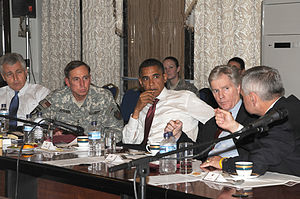 Image via WikipediaSo -- the WH conducted a background briefing by conference call today on the personnel changes that had the beltway buzzing. Here are some excerpts:
Image via WikipediaSo -- the WH conducted a background briefing by conference call today on the personnel changes that had the beltway buzzing. Here are some excerpts:
Tomorrow the President will announce four important appointments of the national security team.
- First he’ll announce that Leon Panetta, currently the Director of the Central Intelligence Agency, will be nominated as Secretary of Defense to succeed Secretary Gates.
- Second, he will announce his intention to nominate General Dave Petraeus as the next director of the Central Intelligence Agency.
- Third, he’ll announce his intention to nominate Ryan Crocker as the United States next ambassador to Afghanistan.
- And fourth, he’ll announce his intention to nominate General John Allen, currently the Deputy Commander for CENTCOM, as General Petraeus’ successor as commander for ISAF and commander for U.S. forces in Afghanistan.
"Karl Eikenberry, ambassador to Kabul, his appointment or tour was coming to an end after two years this spring, and we needed to make a change there."
On this new team:
"And if you work through this -- and we can go through each of the positions -- you have in Ryan Crocker, one of the nation’s most experienced and well-respected diplomats; in General Dave Petraeus, obviously, one of the nation’s preeminent military leaders; Leon Panetta, a deeply experienced public servant; and John Allen, really one of the great leaders of his generation in the military."They're great, they're great -- I don't doubt it. But I want to know how they will wrap up this war and bring the troops home already.
Some excerpts from the Q&A following the briefing:
General Petreaus will retire from the military:
"With respect to your question about whether or not General Petraeus would serve in uniform as director of the Central Intelligence Agency, the answer is that he would not, and that he would retire from the military to take on the position of director of Central Intelligence Agency."Ambassador Crocker offered the position on March 30:
I think it is important to point out, though, in response to your question and underscore Ambassador Crocker’s experience on civilian and military political affairs, where he is really, as you know, really one of our most experienced diplomats in that area. Ryan has 37 years in the foreign service -- I’m looking at the list here -- five ambassadorships: Iraq, Pakistan, Syria, Kuwait, Lebanon. In Iraq, as you know, he worked very closely with General Petraeus; was instrumental in reconciliation efforts, which is an important priority for the United States in the next period of time here in Afghanistan.
Another important fact which I should have mentioned at the outset -- I’ll give you two other facts here, Peter, on this -- is that in January 2002, Ambassador Crocker was sent to Afghanistan to reopen the American embassy in Kabul. And indeed, we received agrement from the government of Afghanistan this morning in a conversation between President Karzai, who obviously knew him then, and the United States representative talking to him today.
The last thing I will say is, again, this is the result of a multi-month process, consultation with Secretary Clinton. And the President met with Ambassador Crocker and offered him this position on March 30.
Eikenberry, Crocker and oh, the Afghan President
Q Hi there. It’s been no secret that the relationship between Ambassador Eikenberry and President Karzai has been a difficult one. Do you think that while you’re hoping that given his wide range of experience, Ambassador Crocker will be able to improve that relationship between the Afghan President and the top U.S. representative, or are the differences that we’ve seen more a function of a different view of the conflict between the governments, rather than just personality?
SENIOR ADMINISTRATION OFFICIAL: Yes, thank you. Let me say a couple of things about that. The first is that Ambassador Eikenberry has served nearly five years in Afghanistan on three tours, two as a military officer and one as U.S. ambassador. And during his time as ambassador and in large part working with General Petraeus at the direction of the President in a conflict where the United States had a real shortage of resources and, frankly, a lack of strategy, he has worked as an integral member of this team to put in place the inputs and to develop a strategy for moving ahead. And it’s resulted, in our judgment -- in quite a bit of progress.
And we would expect, as I said earlier, Ambassador Crocker -- who is one of the most experienced diplomats we have and, in particular, one of the most experienced diplomats we have in terms of civilian-military political operations -- to take up that task; to continue the work with the military moving towards transition; to support the work led by the Afghan government -- and working very closely, by the way, with our Special Representative, Marc Grossman, on the efforts toward reconciliation and moving the peace process forward; and obviously working very closely with the military as the military draws down its resources.
So I guess I would answer it this way, that the President has nominated a person with a deep experience in the region, tremendous experience and success with political-military efforts. So I guess I’d answer your question by pointing out the quality and qualities of Ryan Crocker as an ambassadorial nominee.
To read this awesome and exciting development, click here. Formal announcement, tomorrow.
So, then if the Iraq dream team is reunited in Kabul, it will only be for a brief duration. This time around it'll be Crocker-Allen until the next shuffle.



No comments:
Post a Comment